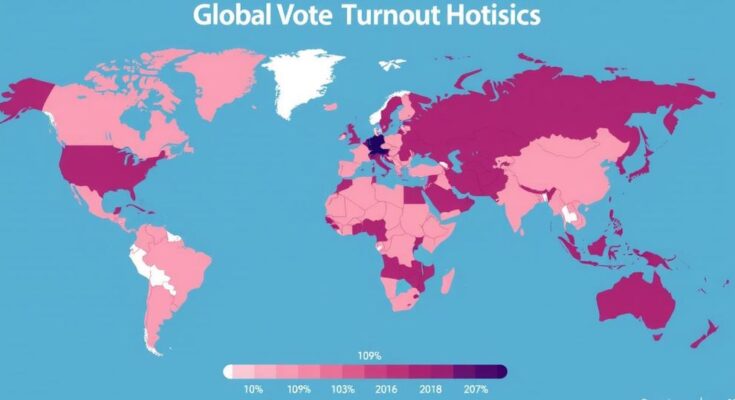In 2024, nearly half of the global population voted across 60 countries, yet results indicated a persistent inclination towards individualistic interests over collective well-being. Economic factors influenced significant political shifts in countries like the UK and the US, while incumbents faced losses in various regions. Vladimir Putin’s overwhelming electoral support further illustrated distorted democratic practices, emphasizing the overarching challenge of safeguarding genuine democracy across interconnected nations.
In 2024, nearly half of the world’s population participated in elections across more than 60 countries, marking a significant moment in democratic history. However, the electoral results revealed persistent trends of selfishness and tribalism, with voters prioritizing personal interests over collective good. In the United Kingdom, economic concerns led to the Labour Party’s decisive win over the Conservatives. Meanwhile, climate change, despite its potential as an existential threat, failed to resonate strongly in voter decisions.
In the United States, President Joe Biden faced electorate backlash despite addressing inflation; the frustration among voters led to a resurgence of Donald Trump. Incumbents worldwide proved vulnerable, with prominent leaders like Joe Biden and India’s Narendra Modi witnessing decreased support indicative of a broader demand for change. Notably, in South Africa, the historically dominant party lost its majority, reflecting a global trend favoring populism and renewed leadership, albeit under challenging circumstances.
On the other hand, Vladimir Putin’s overwhelming support within Russia highlighted the perils of democracy’s superficial applications, exemplifying governance devoid of true democratic principles. Furthermore, the elections illuminated how international relationships and conflicts, particularly between Trump and Putin regarding Ukraine, could shape future global dynamics, signaling a period where the United States may no longer hold its previous status as a democratic trendsetter.
The intricate interplay among global elections underscores the profound impact one nation’s electoral decisions can have on others. While the democratic journey has seen inspiring participation in 2024, it is essential to avoid complacency and strive for genuine representation and accountability in governance.
The 2024 elections across more than 60 countries reflect a significant engagement of nearly half the world’s populace in democratic processes. However, the outcomes raised questions about the voters’ motivations, revealing patterns of individualism and immediate concerns that overshadow broader collective issues, such as climate change. The socio-economic context, stemming from post-pandemic recovery and geopolitical tensions, heavily influenced election outcomes, revealing a global electoral landscape that is increasingly complex and intertwined.
The 2024 elections revealed a complex global landscape where voter motivations often favor personal and immediate interests over collective welfare. While democratic participation was notable, the need for genuine representation and resilience against populist narratives remains critical. As global dynamics shift, the challenge lies in maintaining the integrity of democratic processes amidst rising nationalistic sentiments and economic distress. Ultimately, the electoral outcomes teach a lesson in how interconnected nations and their choices are, shaping not just local but global realities.
Original Source: www.cnn.com




